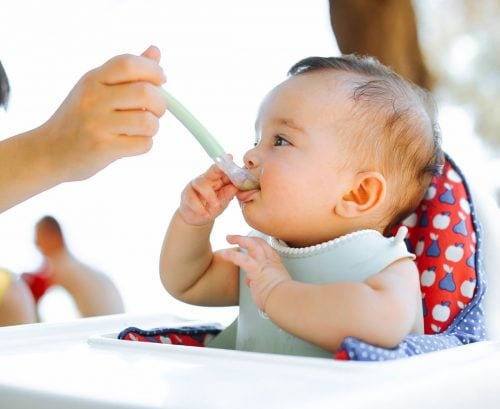Baby food or organic? The choice between baby food and organic baby food depends on your personal preferences and values.
Baby food is convenient and widely available, while organic baby food is made without synthetic pesticides or genetically modified ingredients, which some parents may prefer for their baby’s health.
Why Choosing The Right Baby Food Is Crucial For Your Child’S Development
Choosing the right baby food is crucial as it directly impacts your child’s long-term health. Infants have specific nutritional requirements that need to be met for proper development. Baby food plays a significant role in providing the necessary nutrients to meet your child’s needs.
Ensuring the food is organic can provide additional benefits by reducing exposure to harmful chemicals and pesticides. It is important to pay attention to the labels and ingredients to ensure the food is safe and meets the nutritional needs of your baby.
Taking care of their diet at an early stage can contribute to their overall well-being and set a foundation for a healthy lifestyle in the future.
Understanding The Difference Between Commercial Baby Food And Organic Options
When it comes to baby food, understanding the difference between commercial options and organic ones is essential. Commercial baby food sets itself apart through its mass production and availability in supermarkets. However, organic baby food offers numerous benefits. Organic options are made from fresh and natural ingredients, free from harmful chemicals and pesticides.
They are rich in nutrients and support a healthy immune system. Identifying organic baby food is relatively easy. Look for labels that certify the product as organic, such as the USDA organic seal. Organic baby food often uses locally sourced ingredients and emphasizes sustainable and environmentally friendly practices.
By choosing organic baby food, you can provide your little one with a nutritious and safe start to their food journey.
Unveiling The Hidden Dangers Of Conventional Baby Food
Unveiling the hidden dangers of conventional baby food. Common additives in commercial baby food. Pesticide residues easily found in conventional baby food pose significant health risks that parents should be aware of. Non-organic baby food frequently contains additives that can harm a baby’s delicate digestive system.
These additives can include artificial colors, flavors, and preservatives. Research has shown that consuming non-organic baby food may lead to long-term health problems, including allergies, hormonal disruption, and developmental issues.
It is crucial for parents to become more aware and educated about the potential risks associated with feeding their babies conventional, non-organic food.
Opting for organic baby food can significantly reduce exposure to harmful substances and provide a healthier alternative for the little ones. Choose wisely for your baby’s nutrition and overall well-being.


Credit: www.thebump.com
Decoding The Various Types Of Organic Baby Food Available In The Market
Decoding the various types of organic baby food available in the market, you have options to consider. Freshly homemade organic baby food provides a nutritious and wholesome choice for your little one.
You can make it using fresh ingredients at home, ensuring complete control over what goes into your baby’s food.
Similarly, store-bought organic baby food is readily available in supermarkets and offers convenience for busy parents. These products are carefully crafted to meet the nutritional needs of infants.
Another alternative is organic baby food meal delivery services, which provide ready-to-eat meals delivered right to your doorstep.
They offer a variety of flavors and textures, making it easier for parents to introduce new foods to their babies. With these options available, you can choose the best organic baby food option that suits your needs and preferences.
Making Informed Choices: Factors To Consider When Selecting Baby Food
Selecting baby food requires careful consideration of various factors. This includes assessing ingredient labels to ensure the quality and safety of the product.
Understanding organic certifications can further help in making informed choices. Organic baby food is beneficial as it is free from harmful pesticides and genetically modified ingredients.
Age-appropriate baby food is also crucial as it meets the nutritional needs of growing infants. It is important to choose baby food that is suitable for the developmental stage and dietary requirements of your child.
By analyzing ingredient labels, understanding organic certifications, and selecting age-appropriate options, parents can ensure that their babies are receiving the best nutrition for their overall growth and development.
Preparing Homemade Baby Food: Tips, Recipes, And Safety Precautions
Preparing homemade baby food can be a beneficial and healthy choice for your little one. It allows you to control the quality of ingredients and ensure that your baby gets the nutrients they need.
To get started, you’ll need a few essential kitchen tools like a food processor or blender, steamer, and storage containers.
When preparing homemade baby food, it’s important to follow safety measures to ensure hygienic meals. This includes properly washing and sanitizing utensils, cooking ingredients thoroughly, and storing food at the right temperature.
By taking these precautions, you can confidently provide your baby with nutritious meals while also saving money compared to store-bought baby food options.
Transitioning To Solid Foods: A Guide To A Successful Dietary Shift
Transitioning to solid foods is an exciting milestone in your baby’s development. It’s important to look out for specific signs that indicate your little one is ready for solids. Introduce new foods gradually to avoid overwhelming their delicate digestive system.
Keep an eye out for any potential food allergies or intolerances that may arise during this period. Remember, every baby is unique, so it’s crucial to monitor their reaction to different foods.
Stay observant for any signs of discomfort, rashes, or breathing difficulties.
With careful attention and patience, you can ensure a successful dietary shift for your baby as they embark on their journey of exploring new flavors and textures.
Nurturing Healthy Eating Habits From Infancy To Childhood
Nurturing healthy eating habits in children begins during infancy and plays a significant role in shaping lifelong preferences. Introducing a variety of foods ensures a balanced diet, promoting overall well-being.
Creating a positive mealtime environment fosters a healthy relationship with food, encouraging children to enjoy meals and try new flavors.
Avoiding repetitive terms helps maintain reader interest, while using different expressions adds variety to the content.
By focusing on these principles, parents can instill lasting habits that support their child’s nutritional needs and promote a positive outlook on food.
So, whether it’s baby food or organic options, the key lies in fostering a love for nutritious meals right from the start.
Comparing The Costs: Commercial Baby Food Vs. Organic Options
Comparing the costs between commercial baby food and organic options offers valuable insights. These insights help parents understand the price range of baby food products, enabling them to make informed decisions. While commercial baby food may provide convenience, it is essential to consider the long-term benefits of organic options.
Although organic baby food can require a higher initial investment, budget-friendly strategies can help incorporate it effectively.
By opting for homemade organic baby food or purchasing ingredients in bulk, parents can save money while offering their little ones the nutritional benefits of organic options.
The key lies in striking a balance between cost and quality, prioritizing the health and well-being of your baby. With a bit of planning and creativity, affordable organic baby food can be a feasible choice for parents seeking the best for their child.
Frequently Asked Questions For Baby Food Or Organic
Is Organic Or Natural Baby Food Better?
Organic baby food is better because it is free from harmful chemicals and pesticides.
Should I Buy Organic For My Baby?
Yes, it’s advisable to buy organic for your baby as it ensures pesticide-free and healthier food options.
Why Is Organic Baby Food Better?
Organic baby food is better because it is free from harmful chemicals and pesticides.
Can I Feed My Baby Non-Organic Food?
Yes, you can feed your baby non-organic food.
Key Takeaways: Baby Food Or Organic Baby Food
To sum up, the choice between baby food or organic is ultimately a personal decision for parents. While both options have their advantages, it is important to prioritize the nutritional needs of your child.
Baby food, with its convenience and variety of flavors, can be a time-saving option for busy parents.
On the other hand, organic baby food offers the assurance of lower pesticide exposure and a more environmentally friendly option.
It is recommended to read labels carefully, ensuring that the baby food you choose does not contain any harmful additives or excessive sugar content.
Ultimately, consulting with a pediatrician and considering your own values and preferences can guide you towards the choice that best suits your baby’s needs.
Remember, investing in your child’s health and nutrition is always a worthwhile endeavor.



